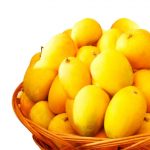Which size of Alphonso mango is best?
size of Alphonso mango
Alphonso mango is a variety of mango known for its unique flavor, aroma, and smooth texture. It is the most highly coveted mango variety and has dedicated fans across the globe. It is also renowned for its high nutritional value, being rich in vitamins and minerals. The fruits have a sweet, fruity flavor and a delicate aroma. The flesh of an Alphonso mango is smooth and velvety, with no fibrous strands present. Its taste is similar to that of a mango with a hint of passionfruit. The fruit has a medium to large size, and its skin is typically a yellow or golden color with a reddish-tinge on some areas.
Alphonso trees grow best in full sun, and they are hardy in USDA zones 9 to 11, though they may need frost protection until they are well-established. The tree can be grown as a container tree in cooler climates, and it will thrive when placed in a sunny, warm location with rich, moist soil.
The ideal temperature for Alphonso Mango is between 24degC to 27degC (75degF and 81degF), which encourages optimum growth and fruit production. The tree is tolerant of extreme temperatures, but prolonged exposure to extremely cold or hot weather can cause damage to the leaves, flowers, and fruit.

Which size of Alphonso mango is best?
It is possible to plant an Alphonso mango tree from seed, but the process can take up to 8 years before the tree bears fruit. Air layering and grafting are two methods of propagation that can speed up the time to fruit, and both have high success rates.
A good Alphonso mango planting site will be in a sunny location with sandy, loamy soil that is well-draining. It is important to note that the trees are highly sensitive to the soil and climatic conditions in which they grow, with even slight changes in conditions having a significant impact on their health and productivity.
During the first year, the tree should be watered regularly to keep the soil moist, but not waterlogged. Once the tree is established, it will need less frequent watering. It is recommended to use balanced fertilizers like 10-10-10 NPK (Nitrogen, Phosphorus, and Potassium) throughout the growing season. It is also advisable to apply organic fertilizers, such as manure or vermicompost, to enhance the quality of the soil and promote healthy growth.
Mangoes are highly susceptible to pests, diseases, and other environmental factors that can affect their health and yield. This is why it is essential to manage the plants and apply a good system of integrated pest management. This will help to protect the plants from infestation and disease, and ensure that the fruit produced is of the highest quality. In addition, it is important to keep the trees well-fertilized to ensure healthy growth and fruiting. The use of an organic fertilizer, such as cow dung manure or vermicompost, will help to keep the soil healthy and prevent the spread of pathogens. In addition to this, regular pruning will help to maintain the health of the plant and increase its yield.